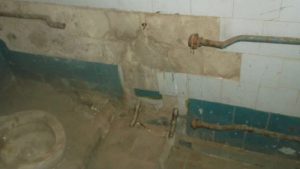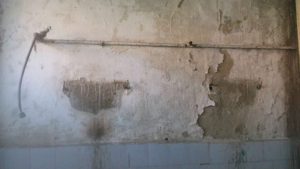Location
Haivoron, Kirovograd Oblast, Ukraine
Community Description
Haivoron is a small Rayon center located in the western-most corner of Kirovohrads’ka Oblast, near the Southern Bug River, and near a large highway that connects Kiev to Odessa.
There are approximately 15,000 people living in Haivoron, most of whom work within the town or in the surrounding villages.
 The town has three schools (all build during the Soviet era), a bazaar, a park, and a cultural building, among other places of note.
The town has three schools (all build during the Soviet era), a bazaar, a park, and a cultural building, among other places of note.
Haivoron School #1 was built around the 1950’s. The school supports more than 400 students – ranging from 1st to 11th form – and over 75 staff daily. The school consists of 30 classrooms, a gym, and two small gathering halls, as well as two bathrooms with squat toilets. The school is both a learning environment for students and an important cultural center for the community.
Problem Addressed
The toilets the kids use are extremely old squat toilets that do not flush. They are corroded and rusted and are cracking and falling apart. Regularly, the kids refrain from going to the bathroom, often “holding it” all day.
In addition, due to the fact that the waste does not exit the school properly, a rancid odor wafts through the halls of the first floor, where the classes are located for the youngest kids.
There are three sinks within the school. One is located within the bathroom for hand washing, and two on opposite ends of the school. Those sinks are for obtaining water for cleaning, as well as for the students and staff to use for drinking.
There are also sinks in the cafe which are used for cooking and cleaning daily.
All of the sinks are old and cracked, and the pipes and faucets rusted and corroded. The existing water filtration system does not function properly.
 The water quality has been tested, and reveals high levels of Nitrate (40 ppm), as well as high levels of pH (8), alkalinity (360 mg) and hardness (425).
The water quality has been tested, and reveals high levels of Nitrate (40 ppm), as well as high levels of pH (8), alkalinity (360 mg) and hardness (425).
The combination of these issues makes for a serious sanitation problem for the students, the staff, and the community, and their health is compromised on a daily basis.
Project Description
This project is to renovate the water and sanitation systems at the school.
The water filter will be replaced, and sinks, pipes and toilets will be purchased and installed.
The reverse osmosis filter will help to remove the nitrate and calcium that is in the water. This filter will also decrease the amount of sulfate, which will bring the pH balance back to a normal level.
The five-stage filters will perform as follows:
Stage 1: Sediment filter removes particulates down to 5 microns
Stages 2 & 3: Carbon block filter removes chlorine taste and odors
Stage 4: TFC membrane rejects impurities down to 1/10,000th of a micron
Stage 5: Final filter for enhancing water quality and taste
Four sinks for the bathrooms will be purchased for kids to wash their hands and for personal hygiene.
New piping and fittings will be installed, eliminating much of the sanitation concerns surrounding the use of those sinks for cleaning and drinking.
Water Charity funds will be used to purchase the toilets, sinks with faucets, and replacement piping.
The project is being carried out by Haivoron School #1 staff, which includes trained maintenance workers and community members.
Parents of the students will donate money to tile the bathrooms.
Project Impact
The project will benefit over 400 students as well as 75 teachers and staff.
Peace Corps Volunteer Directing Project
Caleb Sullivan
Comments
The project provides clean water for drinking and adequate facilities for sanitation and hygiene, thereby improving the health and wellbeing of those who spend their days at the school.
Dollar Amount of Project
$555.00
Donations Collected to Date
$555.00
Dollar Amount Needed
$0.00 – This project has been fully funded through the generosity of the Cristopher Lin, of Diamond Bar, CA, USA, with the help of friends and family of Peace Corps Volunteer Caleb Sullivan.
We encourage others to continue to donate using the Donate button below, and we will notify Caleb of your donation. Additional funds will be used to fund the next project by Caleb and/or those of other PCVs in the country of service.
![]() This project has been finished. To read about the conclusion of the project, CLICK HERE.
This project has been finished. To read about the conclusion of the project, CLICK HERE.